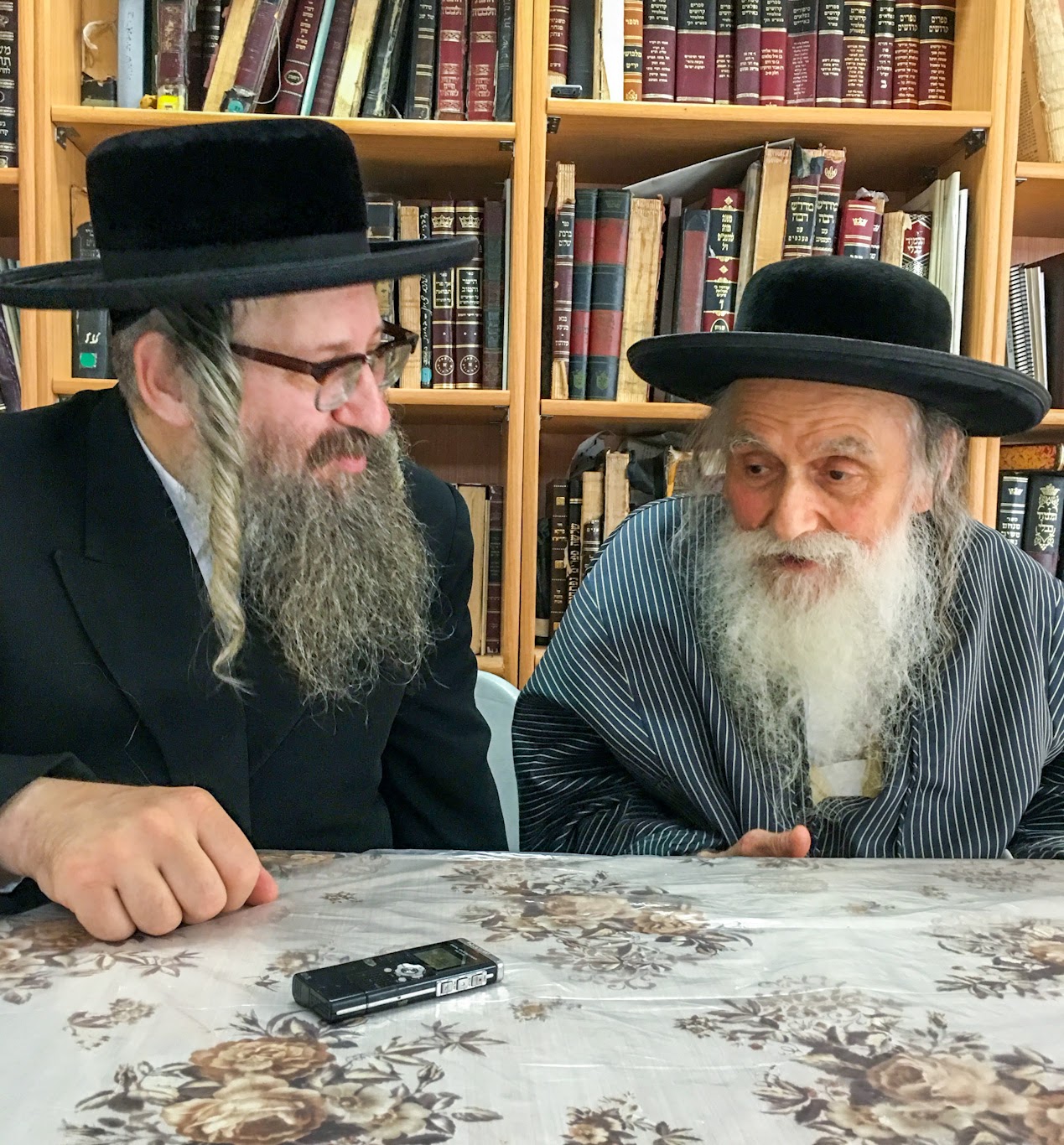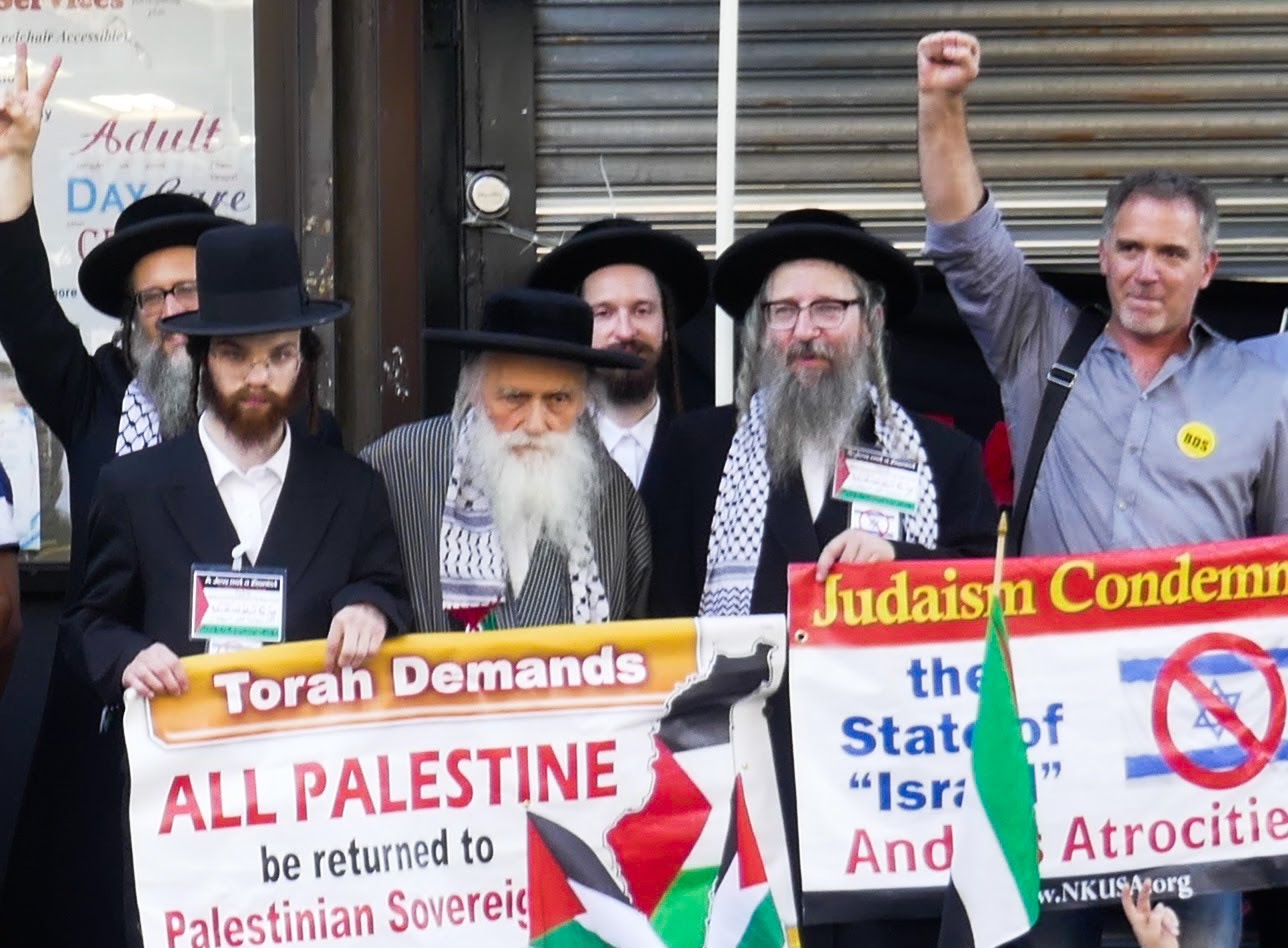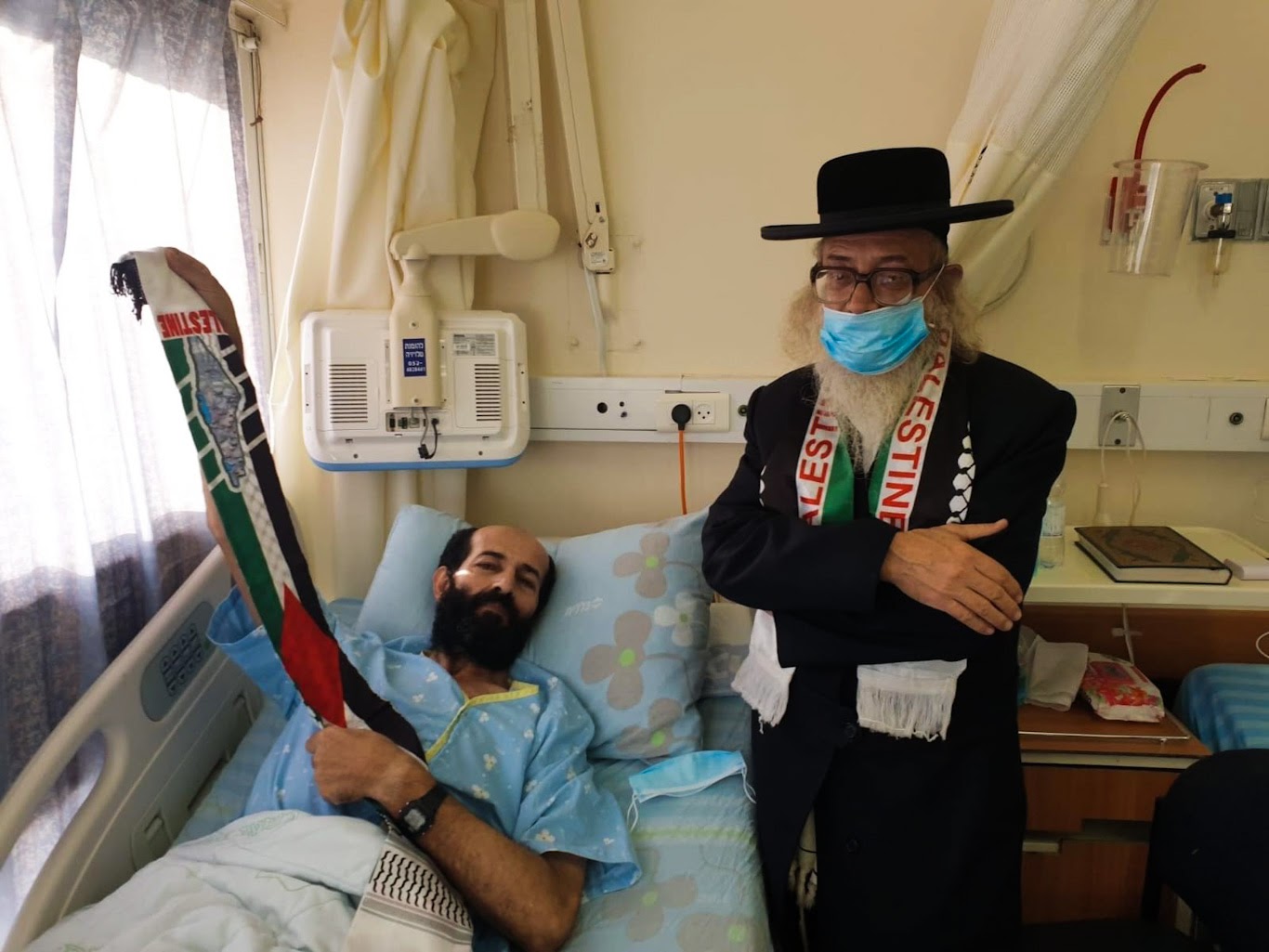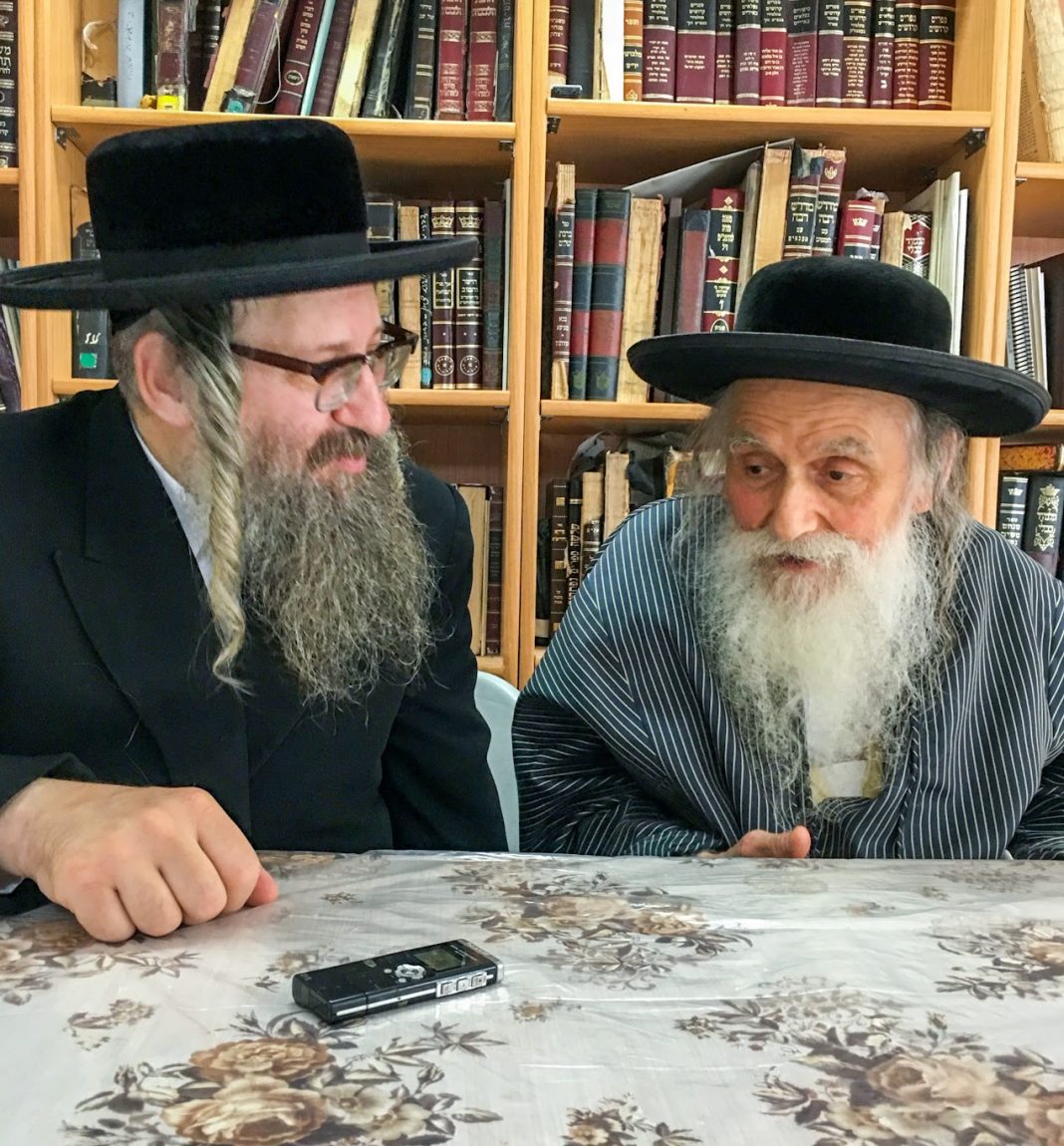Rabbi Moshe Ber Beck was 10 years old in the spring of 1944 when the Nazis invaded Hungary. He spent many months hiding in a bunker in Pest, the eastern side of the Hungarian capital Budapest before he and his family were able to leave. With his mother gone, having been taken to Auschwitz and killed, he and what remained of his family, along with millions of refugees, traveled through Europe to find a home. In 1948 he traveled to Palestine where lived and studied in Jerusalem’s ultra-orthodox community in Mea Shearim. He remained there until 1967 when he left Palestine never to return.
Among the expressions of solidarity posted on the various social media platforms during the November 2020 Palestine Solidarity Week was a photo of Rabbi Beck. Nearly 90 years old and having survived a stroke that left him partially paralyzed, he sat for a photo with a Palestinian flag behind him, and holding a sign that read, “All for Palestine.” One has to admit that his life and religious devotion make his commitment to the Palestinian struggle for liberation all the more remarkable.
Leaving Jerusalem
I met Rabbi Beck for the first time at his home in Monsey, New York. Rabbi Dovid Weiss, another well-known and respected anti-Zionist ultra-orthodox Rabbi and supporter of the Palestinian struggle took me to meet him. The family of Rabbi Weiss, also from Hungary, was murdered by Nazis. “My father was the youngest of ten and he managed to get out. But when he tried to return to help the others escape it was too late.”
I didn’t know who Rabbi Beck was at that point but I could see that he was a revered and greatly respected Rabbi.
I tried to understand what it was that made him decide to leave Jerusalem. He was, at the time, a young man with a large family and little means. He was living and studying at the heart of the ultra-orthodox world in the Holy Land, so I wondered what could possibly have made him want to leave.
Rabbi Beck speaks Yiddish and very little English, so Rabbi Weiss was kind enough to translate. Using hand gestures and even raising his otherwise very quiet voice, Rabbi Beck made it clear there were many reasons for him leaving Jerusalem and all of them had to do with Zionism. After the 1967 war, he and a group of devoted and promising young Rabbis realized that the state of Israel was no place for Jewish people.
He spoke in Yiddish gesturing with his hands pointing to his beard, payos, and religious clothing, and then Rabbi Weiss translated: “He did not want his beard and peyos and kaftan to crown the Zionist state.”

Rabbi Weiss (left) and Rabbi Beck. Photo | Miko Peled
While there were many reasons for his leaving, the final straw was the 1967 Israeli assault on neighboring Arab countries. He felt he had to leave no matter what. With four children and not a penny to his name, he somehow managed to make his way to the UK.
Heresy
Rabbi Beck became more and more animated as he explained to me through Rabbi Weiss that the very idea of the Zionist state is heresy. “He left pure and simple because of Zionism,” Rabbi Weiss explained, and other young notable Rabbis felt that the State was doing everything in its power to disrupt their Jewish way of life.
This seemingly frail, elder Rabbi passionately explained how Zionism and the State of Israel, “scorns and ridicules” the very tenets of the Jewish faith and represents “Kefira,” or heresy. He refused to crown this “facade of Judaism” with his presence and Jewish look and appearance.
“These are our guys”
A story that Rabbi Beck related to me and which I also heard from his son, Rabbi Elhonon Beck in London, involves an incident that took place while Rabbi Beck and many others were sitting in a bomb shelter in Jerusalem during the 1967 war. The neighborhood of Mea Shearim sits in an area that, until 1967, was right on the border between the State of Israel and Jordanian-controlled East Jerusalem. During the war, heavy fighting took place in that area and the people huddled in the bomb shelter could hear the thundering sounds of shooting and explosions.
At one point, they heard warplanes flying overhead when a man walked into the shelter and, wanting to pressure the others, said, “don’t worry, these are ours.” That was something that Rabbi Beck and his fellow Rabbis could not stomach. That religious Jews would associate themselves with Israeli warplanes and refer to them as “ours.” The Zionist State and its army were anathema to them and it was at that moment that several of them decided it was time to leave the country. “They didn’t want their children growing up in that atmosphere where religious Jews felt an association with the Zionist army.”
One result of the Israeli propaganda campaign that followed the 1967 assault was that religious Jews began to believe that the Israeli victory was a miracle. Israel perpetuated the myth that it was faced with the overwhelming force of the Arab armies and was miraculously able to defeat them all. Rabbi Beck and the others in his group see this as heresy, “that a Zionist victory would be seen as a miracle.”
From the rooftop of their Yeshiva, called “Torah Veyir’a” – a famously anti-Zionist Yeshiva in Jerusalem, “you could see the Arab part of the Jerusalem,” which includes the Old City.” Before 1967 one could only look in that direction, but after the war, they were able to go there “and it gave a sense of false power,” which Rabbi Beck abhors. He did not want his children to grow up in an atmosphere that idolizes that kind of power.
A dangerous environment
“Was it dangerous for you to live there?” Rabbi Weiss asked.
“Have you seen their police hit people?” he snapped back.
Rabbi Beck was beaten and arrested by the Israeli police on many occasions during protests against the Zionist state, and while plastering anti-Zionist posters on walls. “The danger was never the Arabs, only the Zionists,” he added.
When the Israeli police enter ultra-orthodox neighborhoods, they do it in full force. Riot police in full gear and often riding specially bred horses, trample people with no regard to the lives or to the safety of the residents. The sights one sees during their marches and protests are harrowing. Only in Israel are religious Jews treated with such contempt and violence.
When I visited Rabbi Beck’s beis midrash (synagogue) in Monsey one Friday night, I saw dozens of religious Jews praying. It is a modest place, and on one of the walls, hangs a large poster denouncing Zionism and its anti-Jewish, heretic characteristics.
Supporting Palestine
This last expression of solidarity by Rabbi Beck was by no means his first. In 2018 I spoke at a rally in Brooklyn and saw him sitting there among other members of the community who came to express solidarity.

Rabbi Beck (center left) and Rabbi Weiss (center right) with members of the ultra-orthodox community at a 2018 protest in Brooklyn. Photo | Miko Peled
Zionist propaganda regularly targets ultra-orthodox Jews who reject Zionism and Israel, creating the impression that they are irrelevant fanatics.
While their numbers may not seem significant their actions certainly are invaluable. When a member of this community pays their respects to a Palestinian family who lost a loved one to an Israeli soldier or shakes the hand of a Palestinian prisoner on hunger strike, or even a gesture as simple as an 87-year-old Rabbi holding a sign to express solidarity with Palestine, it goes a long way. It reminds all of us that in Palestine before the Zionist invasion, people lived side by side in peace, respecting one another. It shows us that there are common goals that unite us.

Rabbi Yisrael Meir Hirsh visits Palestinian detainee and hunger striker Maher Al-Akhras in Jerusalem. Photo | Miko Peled
Feature photo | Rabbi Moshe Ber Beck joins activists marking Al Nakbah as they march across the Brooklyn Bridge in New York City on May 15, 2016. Photo | Shutterstock
Miko Peled is an author and human rights activist born in Jerusalem. He is the author of “The General’s Son. Journey of an Israeli in Palestine,” and “Injustice, the Story of the Holy Land Foundation Five.”
The post Rabbi Moshe Ber Beck Endured a Nearly a Century of Struggle for His Beliefs appeared first on MintPress News.




